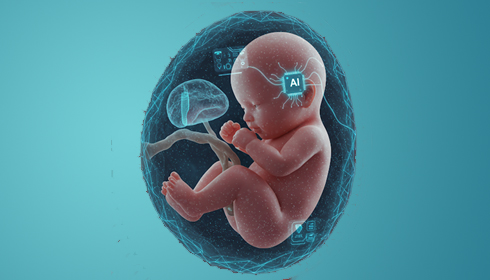
World’s First Baby Born Through AI Assisted Fully Automated IVF Injection System
In a groundbreaking development, the world’s first baby has been born following conception via a fully automated, digitally controlled Intracytoplasmic Sperm Injection (ICSI) system guided by computer algorithms and artificial intelligence (AI). This advancement, detailed in the latest issue of Reproductive Biomedicine Online, marks a significant step forward in the integration of AI into assisted reproductive technology.
ICSI, first introduced in the 1990s, involves injecting a single sperm cell directly into a mature egg. While it has revolutionised fertility treatments, the manual procedure remains technically demanding and subject to human variability. The new system automates all 23 steps of the ICSI process, from sperm selection to microinjection, which are traditionally performed by skilled embryologists.
The technology was developed by a multidisciplinary team at Conceivable Life Sciences, led by embryologist Dr Jacques Cohen, fertility specialist Dr Alejandro Chavez-Badiola of Hope IVF Mexico, and engineer Professor Gerardo Mendizabal-Ruiz. The procedure was carried out at Hope IVF Mexico in Guadalajara as part of a carefully supervised pilot study.
Unlike traditional manual ICSI, the automated system allows remote operation. Specialists in Guadalajara and New York executed each step of the microinjection process through a digital interface. AI algorithms selected viable sperm, immobilised them using lasers, and performed the injection with sub-microscopic precision.
“This system delivers a level of accuracy beyond what human hands can consistently achieve,” said Professor Mendizabal-Ruiz.
The trial involved a 40-year-old patient undergoing IVF with donor eggs after a previous unsuccessful cycle. Five eggs were injected using the automated system, and three were fertilised manually for comparison. Four out of five eggs in the automated group were successfully fertilised—comparable to the three in the control group.
One high-quality embryo created through the automated system was frozen, thawed, and implanted in a later cycle. It led to the successful birth of a healthy baby boy.
Although the procedure took an average of 9 minutes and 56 seconds per egg—slightly longer than manual ICSI due to its experimental setup—researchers expect significant time reductions as the system is refined.
Dr. Chavez-Badiola highlighted the system’s comprehensive automation, which includes sperm selection and handling—steps typically left to human judgement. While the successful outcome is promising, he stressed that broader clinical trials will be necessary to confirm its safety and efficacy.
The rise of automation in fertility treatment is not new. AI is already employed in time-lapse incubators (which capture continuous images of embryo development) to help select embryos for implantation. Partial automation is also used in cryostorage (the freezing of eggs, sperm, and embryos) and sperm analysis.
Experts have long noted that variability in IVF outcomes is often linked to the experience and technique of individual embryrologists. Dr Cohen remarked that this new system offers a “transformative solution”, reducing both performance inconsistencies and stress for lab personnel.
A 2021 review published in Human Reproduction confirmed that embryologist expertise significantly influences fertilisation success, underscoring the need for standardisation in IVF procedures.
However, the introduction of fully automated reproductive technologies also raises important ethical and regulatory considerations. Will global oversight keep pace with fast-moving, borderless applications of AI in medicine? And will access to such innovations remain limited to affluent patients or private clinics?
As the technology moves beyond pilot testing, these questions demand careful public and policy attention. This first birth through a fully automated ICSI system is more than a technical breakthrough—it is a signal of what’s ahead in reproductive healthcare. Automation offers the promise of consistency, efficiency, and potentially broader access in the future. But as AI assumes a growing role in human reproduction, society must ensure this progress is guided by robust ethics and equitable availability. Innovation should not deepen disparities—it should help close them.